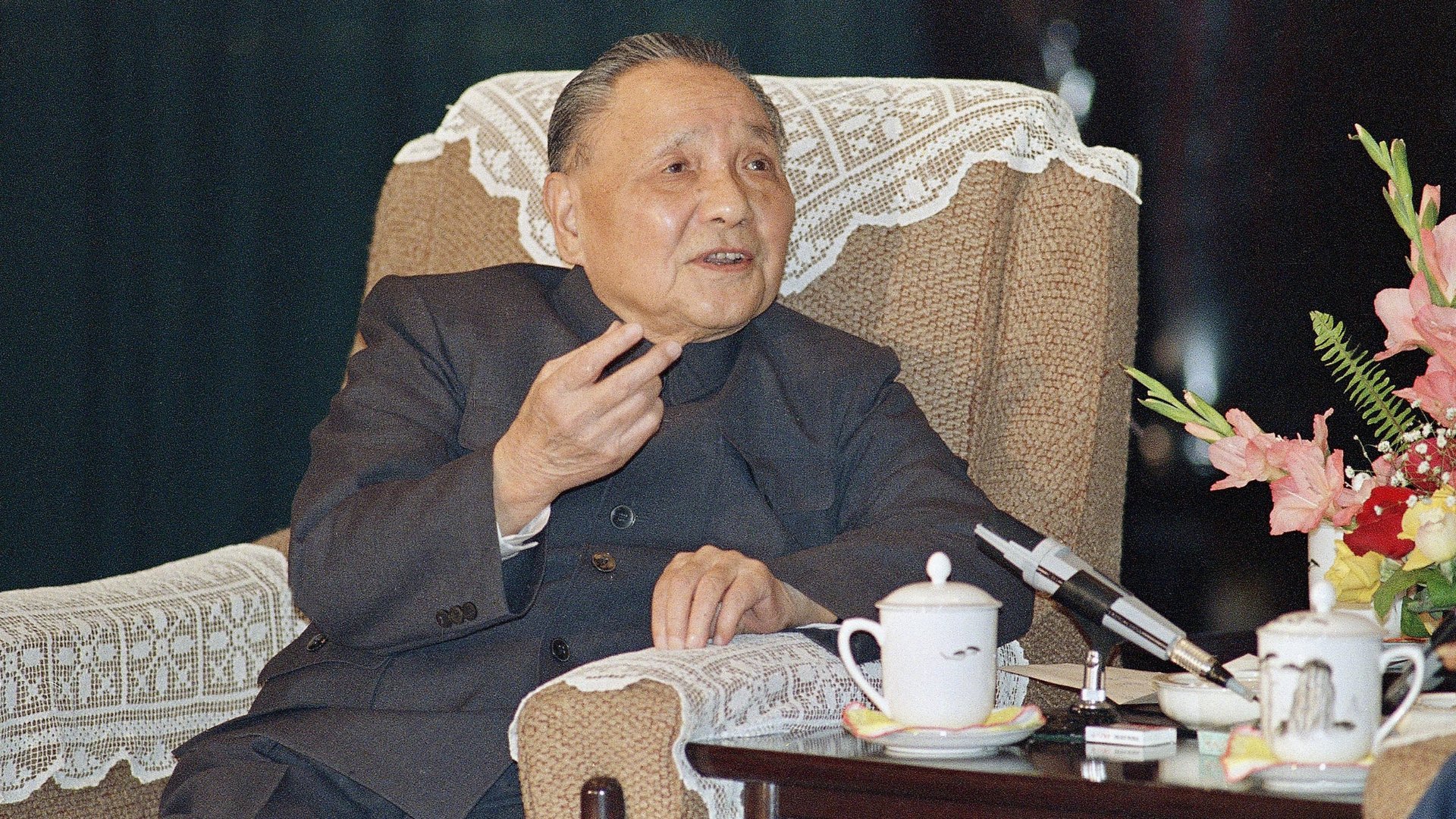What’s with all the weird Chinese Communist Party slogans?
One of the more enjoyable aspects of Chinese leadership changes is the inevitable introduction of a brand new governing slogan. Ever since Deng Xiaoping assumed de facto control of the country in 1978, each successive generation of Chinese leaders has adopted a signature phrase, one that subsequently worms its way into dozens of speeches, policy papers, and other instruments of state propaganda. With Xi Jinping now firmly ensconced into China’s leadership, we fortunately haven’t had to wait long for his own unique contribution to this Chinese oevure: the “China Dream”.


One of the more enjoyable aspects of Chinese leadership changes is the inevitable introduction of a brand new governing slogan. Ever since Deng Xiaoping assumed de facto control of the country in 1978, each successive generation of Chinese leaders has adopted a signature phrase, one that subsequently worms its way into dozens of speeches, policy papers, and other instruments of state propaganda. With Xi Jinping now firmly ensconced into China’s leadership, we fortunately haven’t had to wait long for his own unique contribution to this Chinese oevure: the “China Dream”.
What does “China Dream” mean, exactly? If you’re thinking of a vaguely Sinic version of the American Dream, think again: the China Dream isn’t about rags-to-riches and achieving middle-class bliss but instead refers to aspirations for the country as a whole. The Global Times – China’s most hard-line paper — claims that it has nothing to do with nationalism, but Xi’s own words seem to belie this. Recently, he was quoted as saying that the China Dream is bent on “fulfilling the great renaissance of the Chinese race.”
But before we start mulling over what “The China Dream” may or may not really mean, it’s worth taking a step back and comparing it to the slogans of Xi Jinping’s three most recent predecessors. So without further ado, here is a brief (if not totally comprehensive) history of recent Chinese government slogans:
Slogan: “Socialism with Chinese characteristics”
Deng Xiaoping, who emerged as China’s maximum leader in 1978, is credited with launching the economic reforms that transformed China from a backwater into a global power in less than three decades. In the process, the blunt, diminutive leader unleashed a series of memorable lines, including “it is glorious to get rich” and “it does not matter if a cat is black or white so long as it catches mice”.
But surely, Deng’s most important contribution to China’s official nomenclature is this wonderful phrase: “Socialism with Chinese characteristics”. When he decided to liberalize the economy, the Chinese leadership faced a vexing dilemma: how to square official Communism with a decidedly capitalistic economy. The answer, “with Chinese characteristics” answered that question: Communism is whatever the Chinese said it was. And hey — you can’t say it hasn’t worked, can you?
Slogan: “The Three Represents”
Deng’s successor, Jiang Zemin, waited until near the end of his dozen-plus years in office to offer his very own slogan which, actually, isn’t really a slogan so much as a governing philosophy. “The Three Represents” (it doesn’t make much more sense in Chinese, if you were wondering) means that the Communist Party should represent three things: the development trend of China’s governing forces, the progressive course of China’s advanced culture, and the fundamental interests of the majority.
What this means was this: after decades as a “revolutionary” force organized around the concept of class struggle and other Marxist bromides, the Chinese Communist Party was evolving into something somewhat more ordinary: the government of the People’s Republic of China. Around the same time, in a nod to the changing composition of China’s population, Jiang made waves by allowing business people (read: capitalists) to become Communist Party members for the first time. So in effect, “The Three Represents” signaled to the Chinese people that their government was about to become normal which, in China up to that point, wasn’t normal at all.
Slogan: “Harmonious Society”
Given his colorless, dry nature, it’s hard to believe that Hu Jintao was capable of coining a slogan at all. But in 2005, around when he (finally) consolidated full power of China’s government, Hu unleashed this beauty, designed as a way to put a lid on the simmering discontent in China.
Has it worked? It’s too early to tell. During Hu’s decade-long tenure in office, Beijing dealt with disharmony on a number of fronts, from ethnic tension in Tibet and Xinjiang to localized protests against corrupt leaders and environmental disasters. As economic growth continued (more or less) unabated, Hu’s basic governing philosophy boiled down to this: “Don’t rock the boat.”
One legacy of Hu’s “harmonious society” is its role in one of China’s most enduring Internet memes. As it turns out, the Chinese word for “harmonious society” sounds exactly like the word for “river crabs”, and so the image of the little crustaceans became a widely recognized proxy for the vast cynicism of China’s Internet population. Politically incorrect words, when censored, are often said to have been “harmonized” and thus “eaten by the river crabs”.
So what’s the point of these slogans? Though often the subject of mirth among journalists and citizens alike, Chinese government sayings provide a useful barometer into how the Communist Party has evolved over the last three decades. In 1978, three years after the death of Mao Zedong threw Chinese politics into turmoil, Deng Xiaoping inherited a party whose governing philosophy — Maoism — had effectively bankrupted the entire country. In the years since, the Chinese Communist Party enjoys widespread legitimacy throughout the country despite largely abandoning the very ideology that fostered its creation. With Xi Jinping’s “China Dream”, the country seems poised to occupy (what it views as) its rightful place in world affairs. And that, slogans or not, is pretty remarkable indeed.
Matt Schiavenza is an associate editor at The Atlantic, where he oversees The China Channel.